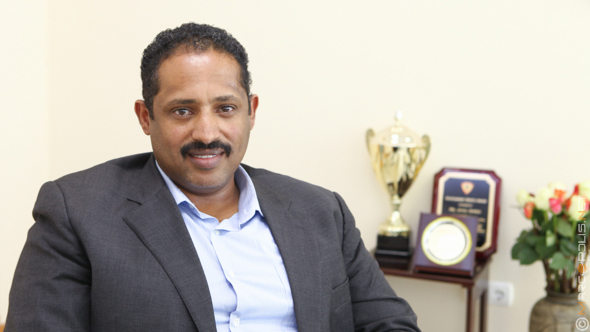
The Ethiopian Roads Administration (ERA) has installed a data centre at its headquarters on Ras Abebe Aregay St., near Mexico Square, with a cost of 300 million Br obtained from the World Bank.
The project was initiated four years ago, with support from the World Bank's capacity-building initiative. The Bank provided the fund to pay for the work that will fully digitise the construction and maintains of roads with a workforce of over 6,000. In the past three years, the ERA oversaw 132 new roads, 88 maintenance projects, and the construction of 16 bridges. Its officials hope the new data centre will cut down on costs and make their operations more efficient.
The Roads Administration, formerly known as the Ethiopian Roads Authority, hired IE Network Solutions Plc, a tech service provider. IE Network was established in 2004 by Meried Bekele, a network engineer, and his shareholders with a five million Birr capital. It has worked on several network infrastructure projects, including building data centres for the Auditor General Office, Dire Dawa University, the Commercial Bank of Ethiopia (CBE), and BGI Ethiopia. The company has over 100 employees and generates annual revenues of 200 million Br.
AH Consulting, a Ugandan-based firm, supervised its latest work with the ERA.
IE Network partnered with Silicon Networks FZE, an IT firm based in the United Arab Emirates (UAE). However, the company faced delays in processing letters of credit to import the materials needed, 90pc of the hardware necessary for the data centre. The project was challenged by delays in acquiring letters of credit (LC) and shipping, according to Dagem Berhanu, an engineer at IE Network.
The data centre consists of a virtualised desktop structure that allows users to share computational capacities such as RAM, storage and processors. This would enable the Administration to cut down on costs for physical computers as users will be provided with a terminal device they can plug into and use on any computer, says Letarik Terefe, software system team leader at the Roads Administration. The data centre can host 1,200 users and a storage capacity of up to 150 terabytes, a size 2.13 times the Google Earth database.
The data centre also boasts a unified communications feature, combining voice, text and video calls in one system. Employees connected to the office network could be able to access the array of communication methods available, while the feature makes it possible for a single phone line to be dedicated to multiple users. The final component is aimed at attaining a paperless workplace, automating and digitising workflow and document storage.
The Administration's data centre is the latest in a series of similar projects. Last year, the Ministry of Innovation & Technology embarked on the 'National Data Centre', a one billion Birr budget repository where all information and statistics of federal agencies can be stored. The implementation of cloud services could push the budget up to 1.5 billion Br, according to Abiyot Sinamo (PhD), director of ICT development and administration at the Ministry.
The past year has also seen Ethio telecom partner with Huawei to launch a data centre to host 800 servers. Private firms have joined the scramble as well, with no less than four embarking on data centre construction at the Addis Abeba ICT Park.
However, according to the national digital strategy document drafted by the Ministry, there are issues in the emerging business. A lack of regulation and certification of data centres results in poor management such as physical security and data protection.
Solomon Mohammed is an IT infrastructure expert who has worked in the industry for close to a decade. He has observed that the existing data centres meet the minimum requirements but not industry standards. According to Solomon, a lack of resources, mainly as the technology does not come cheap, and the unavailability of a skilled workforce are the main roadblocks. He believes the data centre should access multiple power sources, install proper cooling systems and disaster recovery procedures to meet basic standards.
Data centres are expensive, and government agencies should not waste resources attempting to build their own, says Abiyot.
"Independent development is not only costly, but it's not secure either," said Abiyot.
PUBLISHED ON
Oct 23,2021 [ VOL
22 , NO
1121]

Fortune News | Feb 11,2023

Radar | Sep 10,2021

Radar | Jun 19,2021

Radar | Nov 21,2020

Fortune News | Aug 31,2019

Dec 22 , 2024 . By TIZITA SHEWAFERAW
Charged with transforming colossal state-owned enterprises into modern and competitiv...

Aug 18 , 2024 . By AKSAH ITALO
Although predictable Yonas Zerihun's job in the ride-hailing service is not immune to...

Jul 28 , 2024 . By TIZITA SHEWAFERAW
Unhabitual, perhaps too many, Samuel Gebreyohannes, 38, used to occasionally enjoy a couple of beers at breakfast. However, he recently swit...

Jul 13 , 2024 . By AKSAH ITALO
Investors who rely on tractors, trucks, and field vehicles for commuting, transporting commodities, and f...

Oct 25 , 2025
The regulatory machinery is on overdrive. In only two years, no fewer than 35 new pro...

Oct 18 , 2025
The political establishment, notably the ruling party and its top brass, has become p...

Oct 11 , 2025
Ladislas Farago, a roving Associated Press (AP) correspondent, arrived in Ethiopia in...

Oct 4 , 2025
Eyob Tekalegn (PhD) had been in the Governor's chair for only weeks when, on Septembe...